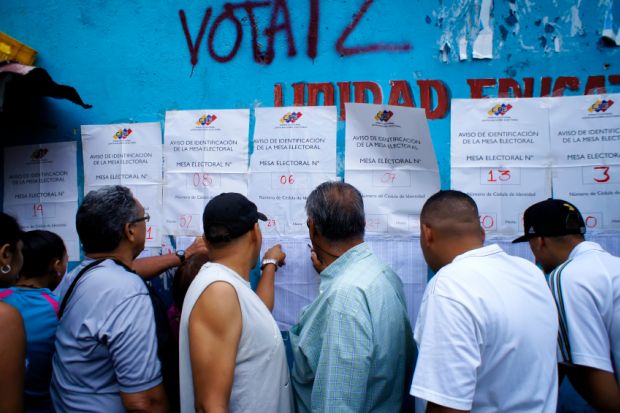Two days after the 6 December legislative elections in Venezuela, the electoral authorities announced a political earthquake: the opposition coalition had defeated the governing Socialist Party founded by Hugo Chávez for the first time in 16 years.
They did not just win control of the legislature, they won a two-thirds “supermajority”, giving them sweeping power to change the membership of the Supreme Court and Electoral Council, remove government ministers, and call for a constituent assembly to write a new constitution.
Chávez’s Bolivarian Revolution had dominated all public institutions, as well as much of the economy and the media, since a recall referendum failed to unseat Chávez in 2004. The one exception was the system of public universities, by law autonomous in Venezuela with the right to control student admissions, faculty promotions and university budgets, and elect university authorities. This autonomy has been gradually reduced, however, and the universities have been closed since September because of budget struggles and a faculty strike over low salaries.
At issue are three fundamental debates affecting the country in a more general sense. First is the severe economic deterioration caused by falling oil prices, extreme currency distortions and inflation reaching 170 per cent. University services have deteriorated and faculty salaries at the unofficial exchange rate average perhaps $40/month (£27).
Second is a debate over the role of subsidised higher education in a revolutionary project that is attempting to create more equitable opportunities for the poor. Free higher education is guaranteed by Venezuelan law, as in many Latin American countries; yet the admissions standards favour those who can afford to attend private secondary schools, and thus taxpayer revenue ends up subsidising the upper and upper middle classes. The Chavista governments attempted to counter this bias and assist poorer students by creating additional public universities with less autonomy, and taking over control of the admissions process for the autonomous universities to ensure that lower class students could also attend.
Third, the universities had been a locus of student protests against government policies. The wave of protests that erupted in early 2014 started with student protests and ended with the imprisonment of dozens of students and several high-profile opposition leaders, with the most prominent – Leopoldo Lopez – sentenced to nearly 14 years and still in prison today. One of the first actions that the opposition has promised when they take control of the new National Assembly on 4 January is to approve an amnesty law to free about 80 people they consider to be political prisoners.
The 6 December vote is an earthquake for Venezuela, demonstrating the vulnerability of a political movement that had seemed almost invincible while Hugo Chávez was alive. Chávez’s premature death in 2013 left a challenging legacy for his successors, with an unsustainable economic model and institutions weakened by decision-making power concentrated in his person.
The opposition may now be tempted to roll back many of the policies and programmes enacted by the Bolivarian Revolution, and to use the constitutional option of a presidential recall to force Nicolas Maduro from power. Yet rapid change could backfire if beneficiaries from the revolution feel threatened. A protracted political struggle between the “civic-military” alliance that constitutes the government and an opposition-controlled legislature will only prolong the economic crisis engulfing the country.
What the country desperately needs is a collective effort by the political and social forces of the country to address the urgent problems of crime, corruption and economic free-fall. The first signals after the elections augured well for the possibility that the dynamic of confrontation and polarisation of the past 15 years may finally be cracked: president Maduro conceded defeat the night of the election and even accepted the devastating loss of control of the legislature; opposition leaders signalled that the main welfare programmes of the revolution should be retained and the National Assembly should be a place for the voice of all Venezuelans.
If these mature attitudes can be sustained, Venezuelans may finally see some relief - and the students could go back to class.
Jennifer McCoy is director of the Global Studies Institute at Georgia State University and co-author of International Mediation in Venezuela.
Register to continue
Why register?
- Registration is free and only takes a moment
- Once registered, you can read 3 articles a month
- Sign up for our newsletter
Subscribe
Or subscribe for unlimited access to:
- Unlimited access to news, views, insights & reviews
- Digital editions
- Digital access to THE’s university and college rankings analysis
Already registered or a current subscriber?




